Top Tastings 2010 (Verdi Black Jack)
ABV: 5%, 8.2% and 8%
Origin: Roncole Verdi, Emilia-Romagna, Italy
Website: www.birrificiodelducato.com
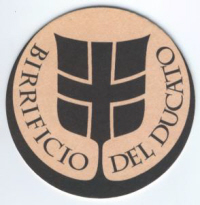 Italy, as I’ve mentioned here before, is currently one of the beer world’s innovation hotspots, with an emerging craft brewing movement fusing native respect for fine food and drink with a creative energy partly inspired by US brewing, and similarly unhindered by a distinctive national brewing tradition. Sadly few of the results of this have so far found their way to Britain. So I was delighted to find myself at a rare tasting of Italian beers, mainly from Birrificio del Ducato, at London’s Rake pub, thanks to a last minute invitation from tasting tutor and Ducato brewer Matteo Milan, who as a former brewer at Scotland’s BrewDog, is still maintaining his British connections.
Italy, as I’ve mentioned here before, is currently one of the beer world’s innovation hotspots, with an emerging craft brewing movement fusing native respect for fine food and drink with a creative energy partly inspired by US brewing, and similarly unhindered by a distinctive national brewing tradition. Sadly few of the results of this have so far found their way to Britain. So I was delighted to find myself at a rare tasting of Italian beers, mainly from Birrificio del Ducato, at London’s Rake pub, thanks to a last minute invitation from tasting tutor and Ducato brewer Matteo Milan, who as a former brewer at Scotland’s BrewDog, is still maintaining his British connections.
Ducato’s style is less edgy than BrewDog’s, but the Italian brewer is if anything more willing to push the envelope, with high gravities, blending, souring with wild yeast, wood ageing and a fresh approach to spicing all key components of the brewing toolkit. Starting production in 2007 in the small village of Roncole Verdi near Parma, a household name in Italy as the birthplace of opera colossus Giuseppe Verdi, the brewery has quickly gone on to win awards under head brewer and co-founder Giovanni Campari, formerly of one of the older-established Italian craft brewers Birrificio Italiano. It might be a fanciful comparison, but some of Ducato’s bigger beers are composed on a dramatic and ambitious scale that might be called operatic.
Matteo brought a wide range of the brewery’s beers, both regular and special brews, and I was highly impressed with almost all of them — it was hard to select only three to feature here, but they do demonstrate Ducato’s range.
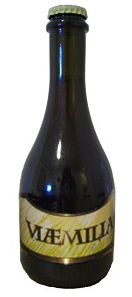 Viæmilia is the brewery’s first beer, its biggest seller and its most suitable offering for easy everyday drinking. “Dedicata alla nostra terra,” it’s named after the old Roman road, the Via Æmilia, which passed nearby on its way from Piacenza to Rimini — the road itself had got is name from the consul that oversaw its completion, and such was its fame that it ended up giving its name to the region through which it passed, still known as Emilia today. The award winning beer is an unpasteurised and properly lagered premium pils-style that in most respects is ultra-authentic, to the extent that the Tettnanger hops is sourced from a small producer in Tettnang itself, necessitating occasional trips to Baden-Württemberg. One important departure from authenticity is the extra addition of whole hops after the primary fermentation, the British-style “dry hopping” technique that’s otherwise completely unknown in traditional lager brewing.
Viæmilia is the brewery’s first beer, its biggest seller and its most suitable offering for easy everyday drinking. “Dedicata alla nostra terra,” it’s named after the old Roman road, the Via Æmilia, which passed nearby on its way from Piacenza to Rimini — the road itself had got is name from the consul that oversaw its completion, and such was its fame that it ended up giving its name to the region through which it passed, still known as Emilia today. The award winning beer is an unpasteurised and properly lagered premium pils-style that in most respects is ultra-authentic, to the extent that the Tettnanger hops is sourced from a small producer in Tettnang itself, necessitating occasional trips to Baden-Württemberg. One important departure from authenticity is the extra addition of whole hops after the primary fermentation, the British-style “dry hopping” technique that’s otherwise completely unknown in traditional lager brewing.
The beer is a hazy very pale yellow with a fine fluffy white head. The dry hopping immediately shows itself in the fresh, big and grassy, lightly fruity and resinous aroma, underlined by delicate and slightly honeyed malt. The palate is a wonderful combination of spicy, floral and rather piny hops and chaffy, foamy and lightly grainy soft malt, leading to a notably peppery finish with exotic spices wafting into the nose. The hops are still kept down to earth, though, by decent, slightly bready and floury malt, so the bitterness isn’t overwhelming. Overall it’s a delightfully moreish and refreshing brew.
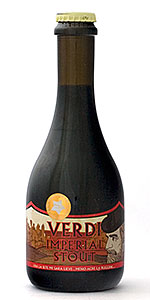
Birrificio del Ducato Verdi Imperial Stout
At the other end of the spectrum in terms of colour and strength is Verdi Imperial Stout, its name honouring Roncole’s most famous son, and once again this is a classic and authentic recipe with a stylish twist. Bottled unfiltered and unpasteurised but with no repriming of yeast, this beer is a still, thick black that leaves a brown iodine-like wash on the sides of the glass as it swirls. The aroma is full of dark marmitey malt, coffee, chocolate and liquorice. The relatively thin and winy palate is fully malty, chocolatey and liquoricey with a big roast bite, but then comes the surprise — the gently mouth-numbing warmth it generates in the mouth is not so much from the alcohol as from some studiously blended chilli.
The balance is just right — not so much as to overwhelm the more traditional spicy and roast notes that emerge in a very long finish, which turns sappy, drying and slightly woody. The beer deservedly became the first and so far only Italian craft brew to win a gold medal in its style at an international beer competition when it was named best imperial stout at the European Beer Star in 2008.
It’s also available in a wonderfully mellowed version aged for six months in bourbon casks under the name Verdi Black Jack. This is black with a good yellowy-brown head, a slightly brett-tinged smooth vanilla, coconut and whisky aroma and a very complex dark malt and chocolate palate with a sweet touch, leahter and whisky hints and the tang of wild yeast. A chocolatey finish has rummy spirit and wine notes and layers of bitterness and honey sweetness. Age has mellowed the chilli heat but it’s still present in a stunningly complex blend of flavours.
Even more of an unusual speciality is La Luna Rossa (“the red moon”), an offbeat reworking of a Belgian sour brown ale-based kriek. It’s a blend of three different beers of different ages matured in wine casks with the aid of wild yeast and a quantity of fresh local marasca cherries, a variety of sour morello cherry classically used to make Maraschino liqueur. This is also bottled more or less still and emerges a deep amber colour, with notes of fruit, almonds, balsamic vinegar and the distinctive tang of brettanomyces yeasts on the aroma.
A sappy woody palate has sweet and sour sauce notes and emerging cherry fruit, an irony Rodenbach-like touch but also obvious shades of lambic-type kriek. The long and slightly sticky finish is amazingly complex, with more wood, vanilla, balsamic and cherry skin notes, a touch of salt, walnuts and wafer biscuits. A breathtaking demonstration of what beer is capable of in the hands of a skilful and inspired brewer.
Read more about these beers at ratebeer.com:
http://www.ratebeer.com/beer/birrificio-del-ducato-viaemilia-via-emilia/79805/
http://www.ratebeer.com/beer/birrificio-del-ducato-verdi-imperial-stout/84864/
http://www.ratebeer.com/beer/birrificio-del-ducato-verdi-black-jack/124259/
http://www.ratebeer.com/beer/birrificio-del-ducato-la-luna-rossa/124170/


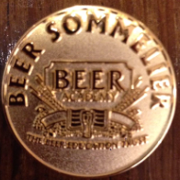
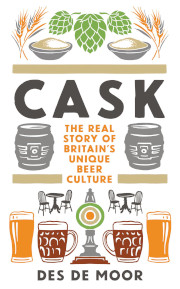
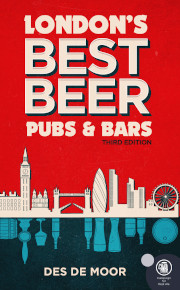
Leave a Reply